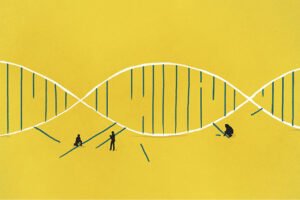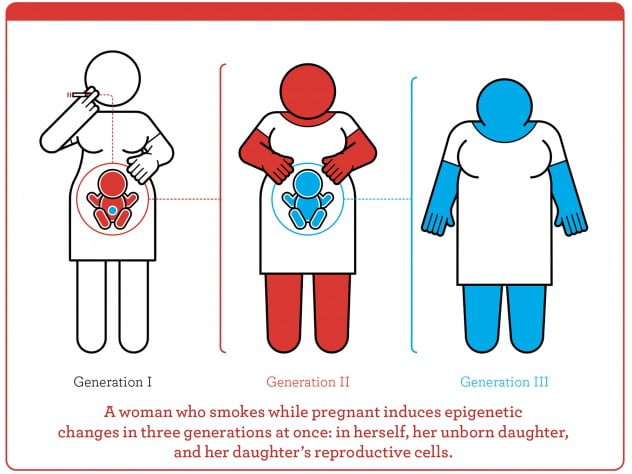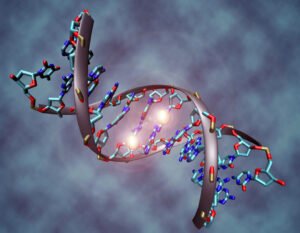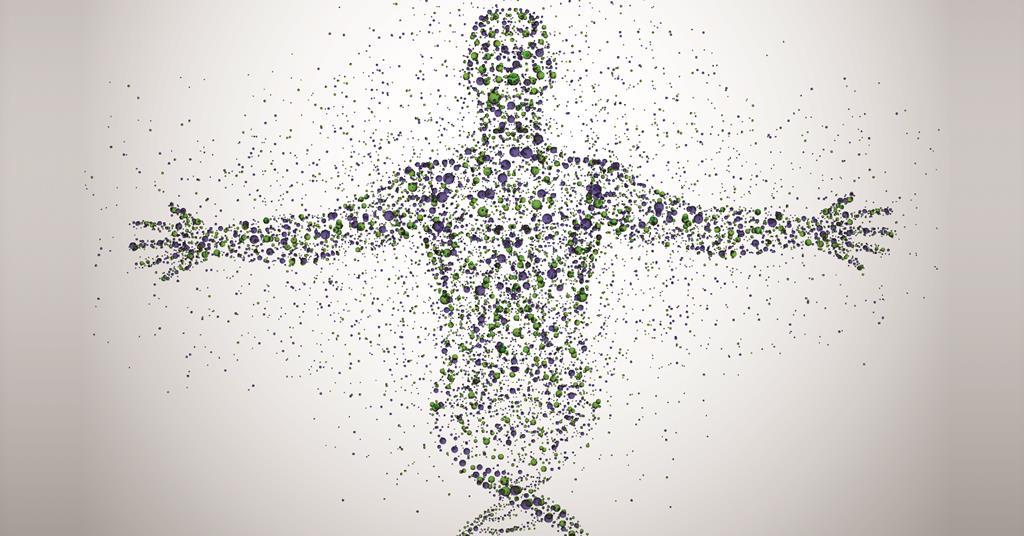The word epigenetics consists of two words, epi meaning “above” and genetics meaning “to produce”. Epigenetics is a science that studies how changes in gene expression or cellular phenotype happen. These changes do not happen because of the DNA sequence but by other things. A gene is part of a person’s DNA. When the gene changes, it also changes the person’s DNA. A study of how our genes evolve by things other than DNA is epigenetics psychology. New science has helped this branch of psychology grow.
Contents
- 1 What is Epigenetics?
- 2 Epigenetics and Genetics
- 3 Epigenetics and Psychology
- 3.1 How can epigenetics influence your psychology?
- 3.2 How Does Stress influence epigenetics psychology?
- 3.3 What Are Some Examples?
- 3.4 How Does Diet Influence Epigenetics Psychology?
- 3.5 When Do Epigenetic Changes Occur?
- 3.6 Can Epigenetic Changes Caused By Trauma Pass On To Children?
- 3.7 What Is The Epigenetic Clock?
- 4 Conclusion
What is Epigenetics?

Epigenetics is the study of changes in organisms that occur due to processes that do not change DNA sequences. Inheritance can happen when a mother or father passes down information from their environment to their kids. This is epigenetic inheritance. The process does not alter genes but instead alters the way people express, or readout, during epigenetic transmission. This can lead to changes in the phenotype or overall physical appearance of offspring.
Stress is when someone scares out of things around him. It can come from something that feels like a threat or a harmful thing. When these environmental stressors activate adaptive responses, they can lead to epigenetic consequences for future generations. Researchers found that when the mothers stress out, the babies could also stress out. The idea is to change how the DNA expresses itself. For example, if you are like me and like chocolate, then your DNA might express that too.
The effects of maternal care can pass down through one generation and even into future generations via epigenetic inheritance. There is a negative impact of how their moms care for them. If the mom takes care of the baby, then the baby’s genes will be different.
Children who were exposed to maternal stress during their prenatal life had increased methylation at these same CpG sites. In other words, they may have been epigenetically modified because of this exposure.
Epigenetic Inheritance
Epigenetic inheritance is when information in DNA is passed to children without any changes. It results in heritable phenotypic differences without alterations in nucleotide sequences or chromosomal structures. When stress activates adaptive responses it can lead to epigenetic consequences for future generations. Children who were around their mother’s stress during pregnancy have the same changes to those genes as their mom.
Epigenetic Definition Psychology
The word “epigenetic” is defined as anything that has an effect on gene expression but it also can relate to psychological disorders such as PTSD, anxiety, and depression.
So it is important to understand the epigenetic definition of psychology so you can be proactive about your health! If you or a loved one are experiencing symptoms of stress-related disorders such as PTSD, anxiety, or depression contact us today at the Mental Health Center of Denver. We offer evidence-based treatment for adults who have experienced trauma with exposure-based treatment, mindfulness techniques, and mentalization-based therapy.
Epigenetics and Genetics

Genetics is the study of how genes and chromosomes work. The most common perceived idea is that we inherit our genetic makeup from our parents (DNA) but in recent years, scientists have found this not to be entirely true. We now know that environmental factors such as stress or diet can actually epigenetically affect gene expression meaning your child may experience health problems because of environmental factors you had no control over.
Epigenetic Transference of Stress During Pregnancy

A study was conducted by McGill University in Montreal, Canada to explore the effects of stress on pregnancy and epigenetics. The research shows how prenatal stress can have a huge effect on future generations! For human beings, proper nutrition during adolescence is essential for proper development. Researchers wanted to know if prenatal stress could affect the eating habits of future generations. They did this by studying pregnant rats that were exposed to different environments during gestation, lactation, and adolescence. Research showed that rat pups born from mothers in the stressed group preferred high-fat diets while the pups born to non-stressed mothers preferred carbohydrates. The researchers believe that these genetic changes can pass on through generations and this is the epigenetic transference of stress during pregnancy.
How Do Epigenetic Changes Affect Gene Expression?
Epigenetic changes are chemical tags that tell the genes to “switch on” or “switch off”. These tags inherit from our parents and environmental factors such as stress, hormones, and diet also play a role in epigenetics. The reason why this is so alarming is that research suggests there may even be an inheritable effect of stress! So if you stress out during pregnancy, your child may predispose to stress too.
What Environmental Factors Influence Epigenetics?
There are many environmental factors that influence epigenetic changes. These can include stress, hormones, diet, and lifestyle choices such as smoking or drinking.
We know that our genes inherit from our parents but there is evidence to suggest that some of the tags placed on your genetic material may pass onto future generations. We also know that environmental factors such as stress, hormones, and diet can affect gene expression which means your child may experience health problems because of something you had no control over! If you or a loved one are experiencing symptoms of stress-related disorders like PTSD, anxiety or depression contact us today at the Mental Health Center of Denver for evidence-based treatment.
Can You Change Your Epigenome?
Yes! There are ways to change your epigenome. The best way is through lifestyle choices such as diet, exercise, and stress control. There is evidence to suggest that our epigenome ages at a faster rate than the rest of our body which means you can make lifestyle changes now like diet, exercise, and stress control to help ensure your cells are healthy in the future!
Epigenetics and Psychology
In recent years, epigenetics has become more and more relevant in the study of psychology. Things like stress or diet affect the epigenetic mechanisms. This can make you more likely to have certain health problems. This research suggests that even psychological disorders such as anxiety, depression, PTSD could pass onto future generations! If you are experiencing symptoms of stress-related disorders like PTSD, anxiety, or depression contact the Mental Health Center of Denver for evidence-based treatment.
How can epigenetics influence your psychology?
Epigenetic changes can happen in your body when you are stressed or eat different foods. This means that you may be more likely to get a health problem before it shows up.
The epigenetic changes that occur during pregnancy can affect the child’s future health. This is because these changes are passed down to your children and even their grandchildren! This field of study has become known as transgenerational inheritance.
How Does Stress influence epigenetics psychology?
Stressful events, whether good or bad, trigger neurotransmitters that affect gene expression. What this means is that if your body experiences stress often, you may be predisposing yourself to certain health conditions even before they arise!
The epigenetic changes that occur during pregnancy can affect the child’s future health. This is because these changes are passed down through generations and influence their grandchildren’s health as well! Transgenerational inheritance has become a field of study in its own right due to how it influences our psychology.
What Are Some Examples?
One study found that women who had lots of stress during their lives were more likely to give birth prematurely than those with little or no stress. Furthermore, men’s sperm count decreased with increased stress due to epigenetic changes.
Another study looked at patients with PTSD and found that their children were more likely to have PTSD as adults because of the trauma they experienced during pregnancy! These are just a few examples of how stress influences your psychological well-being even before you know it.
How Does Diet Influence Epigenetics Psychology?
One recent study had obese mothers lose weight over the course of nine months while pregnant. Surprisingly, those who lost less than average didn’t experience any decrease in birth weight compared to those who lost above average amounts! This shows us that eating healthy is not only beneficial for ourselves but for future generations as well since our environment (diet) influences gene expression which then has an impact on our health and that of future generations.
When Do Epigenetic Changes Occur?

Epigenetic changes can happen at any time but they tend to be more prevalent during pregnancy due to the fact that it is a key developmental stage for both mother and child. These “changes” are actually just molecules attaching themselves onto our DNA strands which then get passed down through generations even if you have a healthy lifestyle or not! Those with poor diets, stressful lives, etc., may predispose their children’s health in ways beyond current medical knowledge since these factors influence gene expression before conception occurs.
Can Epigenetic Changes Caused By Trauma Pass On To Children?
Yes, in fact, this is a new and quickly growing field of study called transgenerational inheritance. Trauma can pass on to children through epigenetic changes which influence their psychological state when they grow up!
Epigenetics psychology has become an important part of the modern world as we learn more about how our environment affects us both psychologically and biologically for better or worse.
What Is The Epigenetic Clock?
The epigenetic clock is a term that describes how our genes change by environmental factors throughout life. These changes are definitely not always bad and in fact, they help protect against the disease! However, there may come a time when these “protections” become dangerous if the environment has an unfavorable impact on us over prolonged periods of time.
Conclusion
With more research, epigenetics is becoming an increasingly important field of study. Scientists are finding that the environment can have a huge impact on how genes behave and this new knowledge will allow for better treatments to be developed in the future.
If you are looking for affordable Online Counseling MantraCare can help: Book a trial therapy sessionPost navigation


